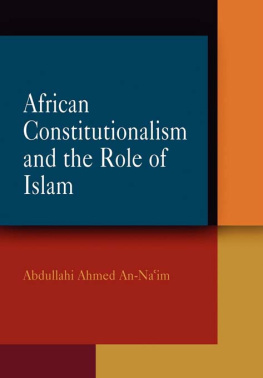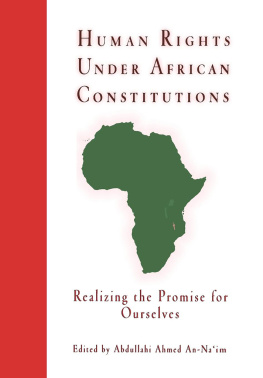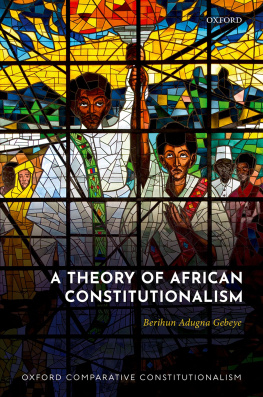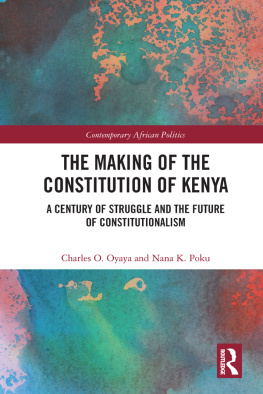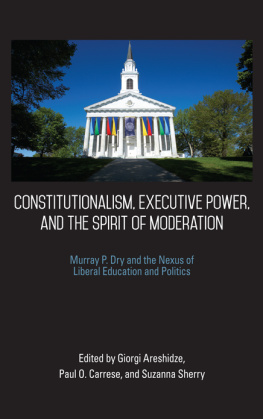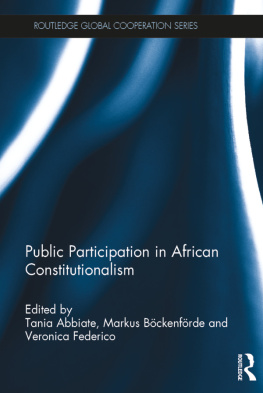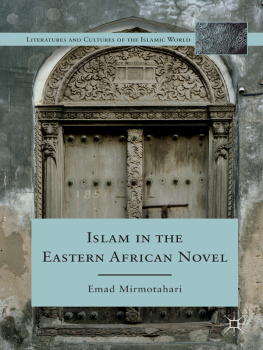African Constitutionalism and the Role of IslamPENNSYLVANIA STUDIES IN HUMAN RIGHTS
Bert B. Lockwood, Jr., Series Editor
A complete list of books in the series is available from the publisher.
Copyright 2006 University of Pennsylvania Press
All rights reserved
Printed in the United States of America on acid-free paper
10 9 8 7 6 5 4 3 2 1
Published by
University of Pennsylvania Press
Philadelphia, Pennsylvania 19104-4112
Library of Congress Cataloging-in-Publication Data
An-Naim, Abd Allah Ahmad, 1946
African constitutionalism and the role of Islam / Abdullahi Ahmed An-Naim
p. cm. (Pennsylvania studies in human rights)
ISBN-13: 978-0-8122-3962-1 (alk. paper)
ISBN-10: 0-8122-3962-8 (alk. paper)
Includes bibliographical references and index.
1. Constitutional lawAfrica. 2. Constitutional lawAfricaPhilosophy 3. Constitutional law (Islamic law). 4. Islam and state. I. Title. II. Series KQC524 .N35 2006
Preface
I began working on this book in 1995 under a grant from the American Council of Learned Societies (ACLS), but had to set it aside when I became the coordinator of a major study of legal protection of rights under the constitutions of sixteen African countries. That project was organized by the International Center for the Legal Protection of Human Rights (Interights) and Inter-Africa Network for Human Rights and Development (Afronet). All those studies were done by African researchers working on their respective countries according to the same terms of reference and uniform format. Ten of those country studies were in due course published in Human Rights Under African Constitutions: Realizing the Promise for Ourselves (University of Pennsylvania Press, 2003). I am pleased to acknowledge the initial grant of the ACLS, and the professional support of Interights and Afronet, but my special appreciation is for the rigorous scholarship and helpful insights of the researchers in that project. That project not only confirmed and helped define the concept of African constitutionalism that I am trying to further develop in this book, but also enabled me to test and revise some of my assumptions and initial thinking on the subject. This background is therefore important to note from the beginning because it relates to the genesis and objectives of this book.
I was already working on the cultural legitimacy of human rights and related ideas, with particular reference to Islamic and African societies, when I participated in a global comparative study of constitutionalism organized by the ACLS in 198889. Working on the Africa regional institute for that project contributed to shaping my understanding of issues of constitutionalism in a pan-African perspective, reaffirmed my commitment to this principle and my belief in the possibilities of its incremental success throughout the continent. The idea of writing a book about constitutionalism in Africa emerged at the end of that ACLS project.
However, it was my subsequent participation in the Interights/Afronet project that confirmed and helped me develop the proactive approach I am attempting to present in this book to emphasize the incremental success of constitutionalism in Africa. Those studies also provided me with a wealth of detailed information on the practical working of constitutional principles in a good cross-section of African countries. In particular, that experience affirmed my belief in the urgent need for socially engaged scholarship without sacrificing its quality. The implementation of that project made it clear to me that it is unacceptable for an African scholar to devote her or his whole attention to detached academic analysis without attempting to respond to the urgent needs and untold suffering of Africans throughout the continent. On the other hand, activist involvement with such issues raises risk of bias and lack of scholarly rigor. While appreciating and attempting to guard against this risk, I see no alternative to positively responding to the need for social engagement of the issues facing African societies.
From this perspective, I am seeking to promote constitutional governance in African societies, by developing ways of enhancing and consolidating the basis of the incremental success of constitutionalism, with due consideration of the difficulties and setbacks experienced by African societies in this regard. Moreover, I am suggesting that such difficulties and setbacks are to be expected as an integral part of the process of adaptation and indigenization of an essentially alien concept of the nation-state and its role in large scale political and social organization. As discussed later in this book, however, the assumption of nation in the nation-state concept can be very problematic in the postcolonial African context.
But my belief in the desirability and possibility of sustainable constitutionalism is based on a certain understanding of the concept, and a proactive approach to the conditions and processes of realizing it in the African context. This understanding and proactive approach should be seen as part of a universal project of constitutionalism that is to be conceived and pursued through global collaborations, but with due regard to the historical and current realities of international economic and political power relations.
A positive or negative outcome of these processes should neither be expected to automatically materialize, nor be assumed to be inevitable or permanent. Since adaptation and indigenization necessarily indicate that there are difficulties to be overcome, the success of these processes can only be incremental, through practical experience over time. This desired objective cannot be realized without critical analysis of experiences so far and pragmatic development and implementation of the necessary strategies in the future. African scholars have an important role to play in this regard, in addition to their personal engagement in political struggles within their respective countries. But scholars cannot play this role without meticulous verification of the factual basis of rigorous analysis. Otherwise, they would be doing a serious disservice to their societies if they compromise on the scholarly quality of their work. In other words, there is no conflict between rigorous scholarship and advocacy for social and political change because maintaining the highest standards of scholarly quality is the prerequisite condition for the role of socially engaged scholars.
The general progression of the analysis I am presenting in this book can be summarized as follows. The first chapter is devoted to a preliminary discussion of the problem of defining and implementing constitutionalism in general, and of the circumstances and assumptions associated with its introduction in late colonial and early postcolonial Africa. But for the concept to survive and thrive over time it has to be adapted and sustained through an indigenous rationale and dynamics of what might be called the dialectic of constitutionalism in Africa and African constitutionalism. This dialectic refers to the processes of progression from constitutionalism as an abstract concept or set of principles to the adaptation and indigenization of the concept or principles to local conditions and context. As I will emphasize later in this book, however, progression includes regression.

